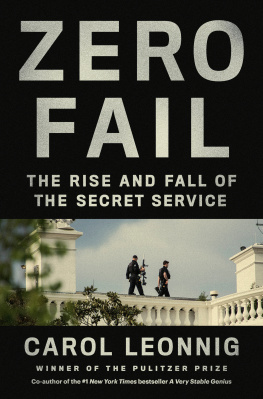
PROTECTING THE PRESIDENT
Copyright 2017 by Dan Bongino
All rights reserved. No part of this book may be reproduced in any form or by any means whether electronic, digital, mechanical, or otherwise without permission in writing from the publisher, except by a reviewer, who may quote brief passages in a review.
Published by WND Books, Washington, DC. WND Books is a registered trademark of WorldNetDaily.com, Inc. (WND).
Book designed by Mark Karis
WND Books are available at special discounts for bulk purchases. WND Books also publishes books in print formats. For more information call (541) 474-1776, e-mail .
Hardcover ISBN: 978-1-944229-86-3
eBook ISBN: 978-1-944229-87-0
Library of Congress Cataloging-in-Publication Data available upon request
Dedicated to the men and women of law enforcement. The brave guardians who selflessly put their lives on the line, defending us against the wolf pack.
CONTENTS
FOREWORD
If you ask any person living in America today what the United States Secret Service does, they will likely tell you, Theyre the guys who protect the president, and that is true. Quite simply, the brave men and women of the Secret Service have an awesome responsibility: They are tasked with keeping the single most important person on Earth, The president of the United States, alive and well. The agency does all this while being an indirect representation to the office of the president, the White House and the people who are affiliated with the executive branch of our government (whether the Service wants to be that representation or not). Agents of the Secret Service must maintain the highest tiers of security while simultaneously respecting privacy, maintaining discretion and trust, and understanding that the organizations own public image coincides with one of the most powerful political figures in the world. Its an incredible burden, and one to which we all owe our gratitude. When it is spelled out with such simplicity, it is equally simple to understand why mistakes and missteps in security just cannot happen. It is also easy to understand what the agencys fundamental mission is: Protection. The average American on the street seems to know it, so one would think that the agency understands it, too. The highest order of the U.S. Secret Service is to keep the commander in chief safe. Anything else, to include image, is a moot point.
When the agency was founded in 1865, it was commissioned to regulate and stop the spread of counterfeit currency in a post-Civil War era. Only later did it take on the mandate that it is so well known for today; that of executive protection at the highest level. This later mission has remained its fundamental core competency ever since, and it is what sets the United States Secret Service apart from other federal law enforcement agencies. Although investigations have remained an intricate part of the career of a U.S. Secret Service Special Agent, the understanding is protection is why everyone is there.
But in the last few decades, the United States Secret Service has forgotten where it began and what it is. An agency that once defined itself by protecting people without negotiating how it will do it now does so with a wink-and-a-nod understanding that the criteria of protection is open to interpretation and adjustment. Someone in the agency came in one day and started replacing right and wrong with black and white, and incorrectly thought that the two meant the same thing.
The right thing is often the hard thing to do; if the right thing were easy, everyone would do the right thing all the time. And we know that doesnt happen. The organization that once told presidents where they could and could not go, decided one day to let White House staffers tell them how to secure a site for a visit, and it has never been the same; leaders who once did the right thing for their agents have been replaced with managers who buckle under the pressure of scheduling ridiculous hours of work for their subordinates, and the lack of morale and high attrition rate speaks for itself as the result. Field office agents who were once locked arm-in arm with their local law enforcement brethren on a protection assignment now tell their local counterparts to stand in corners, out of sight of the protectees who do not wish to see them. The leaders of yesteryear would have never tolerated such treatment of their law enforcement brothers, but the new and improved Secret Service allows this to occur daily, and is blessed at the highest levels of its management offices to do so. The mission used to be protection but the new core competency in todays U.S. Secret Service is image. The agency has sacrificed its mission for its beauty.
For myself, joining the cadre of the United States Secret Service started twenty years before my first day on the job. As a young child, I had the privilege of having a friend whose father was an agent. My friends father was a powerful, positive influence for me in my young life, and it was that influence that propelled my ambition to become a Secret Service Agent. All the professional choices in my life, to include military college, my service to my country as military officer, and just staying out of trouble in my youth were all a means to an end for me: That end was to become a U.S. Secret Service Agent.
The day that I received the call telling me that I was accepted into the agency was one of the happiest, proudest days of my life. I was home alone when the personnel office called, and I paced excitedly while I waited for my wife to come home from work to give her the news. When she arrived home and I told her, she leapt into my arms with an excited squeal. It was wonderful, exciting time for us both, filled with a promise for the future and assurance that I was about to be a part of something special and meaningful for my country; to be part of a great, honorable agency with a single mission focus.
I could not have been more disappointed when I arrived.
The very first thing I noticed was the lack of leadership and accountability amongst the agency. Supervisors were motivated by minute details on meaningless paperwork, and were quick to criticize young agents for ridiculous, subjective things. Abuses in authority were commonplace amongst managers, and morale was terribly low. Truly, the only thing I remember fondly about those days was the camaraderie and bonds I developed with my fellow boot-agents. I genuinely miss the times with those people, and there were only a very limited few supervisors who earned my respect in those days. After nine years, I could take no more. I became another casualty to the problems, the cancer that infects the agency today.
From lack of quality management, to morale, to the hemorrhaging of personnel, the United States Secret Service is in dire need of major overhaul. With this being one of the most polarizing political atmospheres in our countrys history, the demand for quality protection for our leaders is needed now more than ever, so the timing for the U.S. Secret Service to buckle under its own weight could not be worse.
When Dan told me that he was considering writing this book, I enthusiastically encouraged him to do so. Anyone who knows Dan Bongino tends to use words like character, integrity, and morality when describing him. In our time together as agents in the Baltimore Field Office, it was obvious Dan was a right and wrong kind of guy, and not a black and white one.
No one, professionally or personally, is better qualified to outline the problems that plague the United States Secret Service today; no one is better qualified to address the issues and offer the right answers to fix those problems.




